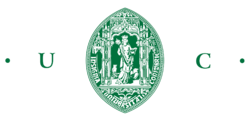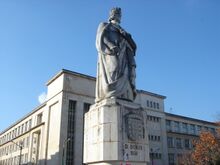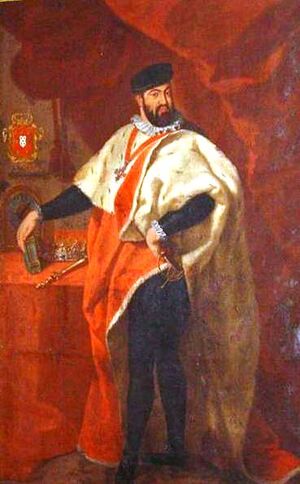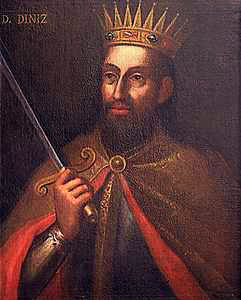University of Coimbra
(University) | |
|---|---|
 | |
| Formation | 1290 |
| Headquarters | Coimbra, Portugal |
| Type | Public university |
| One of the oldest universities in continuous operation in the world, | |
The University of Coimbra (UC; Universidade de Coimbra), is a Portuguese public university in Coimbra, Portugal. Established in 1290 in Lisbon, it went through a number of relocations until it was moved permanently to its current city in 1537, being one of the oldest universities in continuous operation in the world, the oldest university in Portugal, and one of the country's largest museums of higher education and research institutions.[1]
The university is organized into eight different faculties according to a wide range of fields, granting academic bachelor's (licenciado), master's (mestre) and doctorate (doutor) degrees in nearly all major fields of knowledge, such as arts, engineering, humanities, mathematics, natural sciences, social sciences, medicine, sports and technologies. It is a founding member of the Coimbra Group, a group of leading European research universities, whose inaugural meeting it hosted. The University of Coimbra has over 20,000 students, and hosts one of the largest communities of international students in Portugal, arguably being the most cosmopolitan Portuguese university.[2]
On 22 June 2013, UNESCO added the university to its World Heritage List.[3]
Contents
History

The university was founded, or ratified, in 1290 by King Dinis, having begun its existence in Lisbon with the name Studium Generale (Estudo Geral).[4] Scientiae thesaurus mirabilis, the royal charter announcing the institution of the University was dated 1 March of that year, although efforts had been made at least since 1288 to create this first University in Portugal; it is thus the second oldest of such establishments in the Iberian Peninsula. The Papal confirmation was also given in 1290 (on 9 August of that year), during the Papacy of the Pope Nicholas IV. In accordance with the Papal Bull, all the "licit" Faculties, with the exception of that of Theology, could be established. Thus the Faculties of Arts, Law, Canon Law and Medicine were the first to be created. It was, however, not to remain in Lisbon for long. In 1308, likely due to problems of emancipation from the Church (relations between the latter and the political power being somewhat strained at the time) and conflicts between the inhabitants of the city and the students, the University moved to Coimbra. This town already had old traditions in education, being home to the highly successful school of the Monastery of Santa Cruz. The university was then established on the site known as "Estudos Velhos", which corresponds roughly to the area where the Main Library now stands.
In 1338, during the reign of Afonso IV, it was once again transferred to Lisbon, from whence it returned in 1354, this time to the centre of the town which was then in full expansion. In 1377, during the reign of King Fernando, it was transferred yet again to Lisbon, where it would remain for over a century and a half. The authorization for a Faculty of Theology probably dates from this period – around 1380. In 1537, during the reign of João III, the university moved definitively to Coimbra, where it was installed in the Alcaçova Palace which was subsequently purchased from the Royal Family in 1597.[5]
The university institution, including all the books from its library, were moved from Lisbon to Coimbra. Teachers were not guaranteed a position at the new location and many did not move; in fact, most of the new faculty were previously with the University of Salamanca. For the most part, the curriculum was retained.[6]
At the same time, university colleges were created, a restructuring of the curricula was undertaken and new teachers, both Portuguese and foreign, were admitted.

In the 18th century, the Marquis of Pombal, Minister of the kingdom, made radical reforms in the University, especially regarding the teaching of sciences, in accordance to his Enlightenment and anticlerical creed. During many decades it was the only university in Portugal, since its foundation in 1290 until 1559 (a university in Évora operated between 1559 and 1759), and again between 1759 and 1911 (University of Lisbon and University of Porto were created in 1911). The long history and past predominance of the University of Coimbra made it an important focus of influence in Portugal, not only educational, but also political and social.
Initial steps towards some convergence of European higher education systems were taken with the signature of the Sorbonne declaration by the Ministers in charge of higher education in France, Italy, the United Kingdom and Germany, in 1998, and later, in 1999, with the signature of the Bologna declaration. The Bologna process, aimed at creating a European Higher Education Area by implementing a comparable degree structure, common quality assurance standards and by promoting the mobility of students and faculty members, was a major revolution in Europe's higher education. Globalization, technological change and increased international competition for scarce high-skilled labor highlighted the importance of making European higher education institutions attractive and competitive worldwide. A more integrated European Higher Education Market enhanced competition between European universities—a necessary condition for producing leading-edge innovations and for catching up with the US economy. In Portugal, the University of Coimbra decided to defer the adoption of the new Bologna Process model from 2006 to 2007/2008 (with exceptions authorized for a few programs on which a national consensus for change had been reached among institutions) in order to make the transition maintaining the highest standards of quality and academic integrity. Only in the 2008/2009 school year did the entire university fully adopt the new programs within its 8 faculties.
Reputation
The University of Coimbra is among the major science and technology hubs for applied and fundamental research in Portugal. One of the most powerful supercomputers in Portugal belongs to the University of Coimbra and is managed by the Laboratory for Advanced Computing of the Department of Physics at the University of Coimbra.[7] Built in the mid 2000s, the supercomputer was called Milipeia, using 528 processors and 1000 GB of memory. Its capacity has been expanded since then. The main tasks of the university's supercomputer include modeling and calculus in molecular biology, genetics, particle physics, astrophysics, mathematics, engineering, geophysics, condensed matter physics, etc. Besides University of Coimbra's researchers, other Portuguese scientific community members are allowed to work with Milipeia.[8]
Alumni
Noted professors and lecturers
- Egas Moniz (1874–1955), physician and neurologist; 1949 Nobel Prize in Medicine or Physiology
- José Bonifácio de Andrade e Silva (1763–1838), Brazilian statesman and naturalist
- Félix Avelar Brotero (1744–1828), botanist and professor
- George Buchanan (1506–1582), a Scottish historian and humanist scholar, professor at the Colegio de la Artes
- Luís Wittnich Carrisso (1886-1937), botanist, professor
- António Castanheira Neves (1929), legal philosopher and professor emeritus at the law faculty
- Fernão Lopes de Castanheda (1500–1559), historian, bedel and archivist
- André de Gouveia (1497–1548), head teacher, humanist and pedagogue
- Alexandre Rodrigues Ferreira (1756–1815), naturalist
- Eduardo Lourenço (born 1923), professor, essayist, critic, philosopher, and writer
- Pedro Nunes (1502–1578), mathematician
- Sidónio Pais (1872–1918), politician; President in 1918; military; professor of mathematics
- Carlos Mota Pinto (1936–1985), Prime Minister
- António de Oliveira Salazar (1889–1970), politician; Prime Minister; Dictator of Portugal, 1932-1968
- Fernando Távora (1923–2004), architect and professor
- Domenico Vandelli (1735–1816), Italian naturalist
Noted attendees
Noted persons who graduated from or otherwise attended the university include:
- Zeca Afonso (1929–1987), singer, songwriter and poet; left-winger whose music is considered a symbol of the Carnation Revolution
- Manuel Alegre (1936), poet; politician; member of the Socialist Party (did not graduate)
- António José de Almeida (1866–1929), politician, President, founder of Lisbon and Porto universities
- Nicolau Tolentino de Almeida (1740–1811), foremost Portuguese satirical poet of the 18th century
- José de Anchieta (1534–1597), jesuit missionary, apostle of Brazil, writer and poet
- José Alberto de Oliveira Anchieta (1832–1897), 19th century explorer and naturalist (did not graduate)
- Leão Ramos Ascensão (1903–1980), integralist politician and writer
- Manuela Azevedo (1970), singer
- João Botelho (1949), film director (did not graduate)
- Luís de Almeida Braga, (1890–1970), integralist politician and writer
- Teófilo Braga (1843–1924), politician, President, writer and playwright
- Luís Vaz de Camões, (c. 1524–1580), considered Portugal's greatest poet (did not graduate)
- Jorge Chaminé (b, 1956), baritone; Human Rights Medal from the UN; Goodwill Ambassador of Music in ME (Music in the Middle East)
- José Cid (1942), singer and composer (did not graduate)
- Christopher Clavius (1538–1612), German mathematician and astronomer; main architect of the modern Gregorian calendar
- Narana Coissoró (1933), lawyer and politician
- Fausto Correia (1951–2007), politician; member of the Portuguese Parliament and the Government of Portugal; member of the Parliament of the European Union
- João de Deus (1830–1896), poet (did not graduate)
- Bishop James Warren Doyle (1786–1834), Bishop of Kildare and Leighlin in Ireland, studied for his doctorate in combria
- Vergílio Ferreira (1916–1996), writer and teacher
- Armindo Freitas-Magalhães (1966), psychologist and researcher, working on the psychology of the human smile
- Almeida Garrett (1799–1854), romanticist and writer
- Manuel Teixeira Gomes (1860–1941), political figure (did not graduate)
- Ruy Luís Gomes (1905–1984), mathematician
- João Mário Grilo (1958), film director (did not graduate)
- Miguel Guedes (1972), musician, songwriter and singer
- Gregório de Matos e Guerra (1636-1696), poet and lawyer
- Bartolomeu de Gusmão (1685–1724), naturalist, recalled for his early work on lighter-than-air ship design
- Artur Jorge (1946), football coach and former football player (did not graduate at this university but at the University of Lisbon)
- Guerra Junqueiro (1850–1923), lawyer, politician, member of the Portuguese House of Representatives, journalist, author and poet
- Valentim Loureiro (1938), military major, politician, mayor, former football club chairman (did not graduate)
- Fábio Lucindo (1985-), Brazilian voice actor, best-known for his work in anime.[9]
- Bernardino Machado (1851–1944), politician, President
- Marquês de Pombal (1699–1782), Prime Minister to King Joseph I of Portugal throughout his reign
- Aristides Sousa Mendes (1885–1954), diplomat, known for protecting European Jews as a consul in France during World War II against government orders
- Luís Marques Mendes, (1957), politician; former leader of the Social Democratic Party
- Manoel da Nóbrega, (1517–1570), jesuit priest; first Provincial of the Society of Jesus in colonial Brazil; influential in the early history of Brazil; participated in the founding of several cities
- António Nobre (1867–1900), poet (did not graduate)
- Adriano Correia de Oliveira (1942–1982), musician, famous singer and composer of politically engaged folk music in the 1960s-70s (did not graduate)
- Carlos de Oliveira (1921–1981), poet and novelist
- Álvaro Santos Pereira (1972), economist and professor
- Eça de Queiroz (1845–1900), novelist, one of the leading intellectuals of the Generation of 1870
- Antero de Quental (1842–1891), poet, philosopher, political activist
- José Hipólito Raposo (1885–1953), integralist politician and writer
- José Adriano Pequito Rebelo (1892–1983), integralist politician and writer
- Maria de Belém Roseira (1949), politician (member of the Socialist Party, former minister)
- António de Almeida Santos (1926), politician and minister
- Fernando Machado Soares (1930), fado singer, author, judge
- Miguel Torga, pseudonym of Adolfo Correia da Rocha (1907–1995), writer, poet and physician
- João Maria Tudela (1929), singer, musician and entertainer (did not graduate)
- Salgado Zenha (1923–1993), left-wing politician and lawyer
Alumni on Wikispooks
| Person | Born | Died | Nationality | Summary | Description |
|---|---|---|---|---|---|
| Jose Pedro Aguiar-Branco | 18 July 1957 | Portugal | Politician Lawyer | Single Bilderberger Portuguese Defense minister. Potential leader of the Social Democrats, but failed to gain position. | |
| Clara Ferreira Alves | 2 August 1956 | Portugal | Author Journalist | Portuguese journalist who attended the 2011 Bilderberg. Member of the CIA-close German Marshall Fund | |
| Francisco Lucas Pires | 19 October 1944 | 22 May 1998 | Portugal | Politician Academic | Portuguese pro-European Union politician who attended Bilderberg/1988 |
| Manoel Sarmento Rodrigues | 15 June 1899 | 1 August 1979 | Portugal | Academic Mariner | Portuguese colonial administrator trying to keep the empire intact with reforms. Attended the 1959 Bilderberg meeting, where one of the topics was "What are the elements in the evolving picture in tropical Africa that may affect Western unity?"; and the 1960 Bilderberg meeting. |
| António de Oliveira Salazar | 28 April 1889 | 27 July 1970 | Politician Economist | ||
| Miguel Veiga | 30 June 1936 | 14 November 2016 | Portugal | Politician Lawyer | Portugese lawyer and politician. He participated in the 1994 Bilderberg meeting. |
References
- ↑ http://www.topuniversities.com/universities/university-coimbra
- ↑ International Students and Researchers
- ↑ https://whc.unesco.org/en/list/1387 World Heritage Centre
- ↑ http://www.topuniversities.com/universities/university-coimbra
- ↑ https://www.uc.pt/en/informacaopara/visit/paco/greathall, The Royal Palace
- ↑ https://books.google.com/books?id=tntEAgAAQBAJ&pg=PA469 page=469
- ↑ http://www.lca.uc.pt/pt/milipeia.php Laboratório de Computação Avançada
- ↑ https://web.archive.org/web/20110929221302/http://diariodigital.sapo.pt/news.asp?section_id=44&id_news=247909
- ↑ http://televisao.uol.com.br/noticias/redacao/2015/09/08/apos-16-anos-protagonista-de-pokemon-trocara-de-voz-no-brasil.htm
